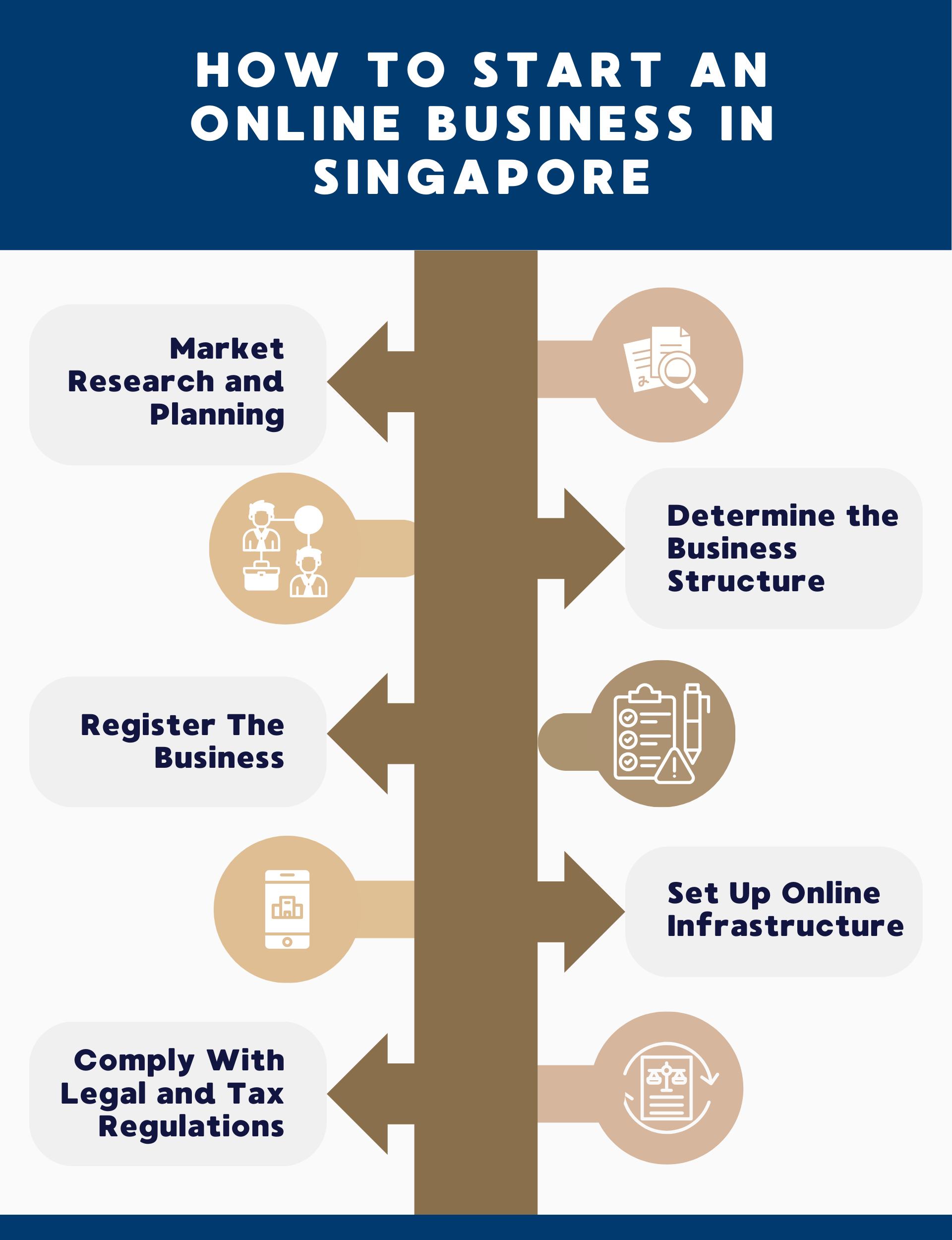
Starting an online business has never been more appealing. With technology reshaping how we live and work, many Singaporeans are exploring digital ventures as a way to achieve financial independence, greater flexibility, or even a secondary source of income. Online businesses cover a wide range of activities, from freelancing and marketing to e-commerce and digital services, allowing entrepreneurs to reach both local and global audiences without the traditional overhead costs of running a physical store.
Beyond the convenience of working anywhere, online businesses also offer scalability. You can start small, test ideas with minimal capital, and gradually expand as demand grows. This accessibility makes the digital economy an exciting frontier for both first-time entrepreneurs and experienced professionals. In this article, we will explore 10 online business ideas for 2025 and provide a practical step-by-step guide on how to set up your own venture in Singapore.
Note: The information provided in this article is for general informational purposes only and does not constitute professional advice. Readers are encouraged to consider their personal circumstances and consult with a qualified professional before making any decisions based on the content of this article.
Top Online Business Ideas
A good online business idea is one that leverages your skills, requires relatively low upfront investment, and caters to growing market demand. In Singapore, digital adoption is strong, making opportunities such as affiliate marketing, e-commerce, and freelance services highly attractive. The following list highlights ten options that combine flexibility with income potential.
Affiliate Marketing
Affiliate marketing involves promoting products or services through tracked links and earning a commission for each sale or lead generated. To get started, join affiliate programmes such as Amazon Associates, Shopee, or Lazada, and promote products via your website, blog, or social media platforms like Instagram and TikTok.
It is ideal for those who already have an engaged audience or are keen to build one. The key advantage lies in its low start-up cost and passive income potential once your content gains traction.
Content Writing
Content writing remains one of the simplest online businesses to start. Aspiring writers can showcase their work through a portfolio and offer freelance services on platforms like Fiverr and Upwork. You can also promote your services on LinkedIn, Instagram, or directly approach agencies seeking writers.
Content writing offers flexibility, global opportunities, and the chance to sharpen your skills while building a reputation. The scalability of this business depends on the ability to specialise in niches such as finance, tech, or lifestyle.
Digital Marketing Services
Digital marketing encompasses search engine optimisation (SEO), pay-per-click advertising (PPC), email marketing, and social media campaigns. As a freelancer or small agency, you can support businesses looking to strengthen their online presence. With digital spending on the rise in Singapore, this sector offers strong growth potential. Advantages include the opportunity to work across industries and develop long-term client relationships.
These courses can give you the essential skills:
Dropshipping
Dropshipping allows you to sell products online without holding inventory. Instead, suppliers fulfil orders directly to customers. To start, set up an e-commerce store through platforms like Shopify or WooCommerce, choose reliable suppliers, and focus on marketing your store.
The main benefits are low upfront investment and the ability to test multiple products without significant risk. However, success relies heavily on good supplier relationships and effective digital marketing.
E-Commerce
Unlike dropshipping, traditional e-commerce involves sourcing and stocking products. You can sell through your own website or platforms such as Shopee, Lazada, and Qoo10. Building an e-commerce business requires inventory management, order fulfilment, and strong branding, but offers higher control over quality and customer experience. With Singapore’s strong digital infrastructure, e-commerce continues to be a highly lucrative sector.
Here are some of the many programmes that can better prepare you:
- E-commerce Ecosystem Fundamentals and Key Performance Indicators
- E-commerce Ecosystem Supply Chain Management Fundamentals
- Ecommerce Ecosystem Effective Design for Digital Merchandising
- E-commerce Ecosystem Content and Social Media Marketing Strategies for Business Growth
Graphic Design
Freelance graphic designers can create logos, marketing materials, or even digital assets for clients. To begin, develop a professional portfolio on platforms like Behance or Dribbble, and advertise services through freelancing sites or social media.
This business suits individuals with creative flair and design software skills. Advantages include flexible working hours and the ability to work with international clients across diverse industries.
Social Media Management
Social media managers help brands grow their online presence through content creation, scheduling, and analytics. This role often involves managing platforms like Instagram, LinkedIn, TikTok, or Facebook. You can find opportunities through freelancing sites or directly pitch to SMEs in Singapore. Advantages include high demand and recurring income through monthly retainers.
These courses can help strengthen your capabilities:
- Masterclass: Amplifying Business Impact on Social Media in the Digital Age
- Advanced Certificate in Generative Artificial Intelligence-Enhanced Social Media Content Creation
- Digital Age Content Creation 101: Initiating Your Journey into Crafting Engaging Social Media Content
Translation Services
Bilingual or multilingual professionals can offer translation services for companies expanding internationally. This may involve translating websites, legal documents, or marketing materials. You can advertise services on freelancing sites or join agencies that connect translators with clients.
Translation services are particularly valuable in Singapore’s multicultural setting, and they provide opportunities to work with global organisations while enjoying flexible hours.
Virtual Assistant
Virtual assistants (VAs) handle administrative tasks such as scheduling, email management, bookkeeping, and customer support for businesses. You can start by listing your services on platforms like Upwork or reaching out directly to small businesses and entrepreneurs.
Being a VA allows you to work remotely, take on multiple clients, and gain experience in different industries. The role’s flexibility makes it especially attractive to those who enjoy organisation and multitasking.
Website and Mobile App Design
With businesses increasingly reliant on digital platforms, web and app designers are in high demand. Services may include designing user-friendly websites, building mobile applications, and ensuring responsive layouts.
Beginners can start by learning coding or using website builders, while advanced designers may provide customised solutions. The benefits include high earning potential and continuous demand for updated digital experiences.
These courses can equip you to deliver professional results:
- Professional Certificate in Mobile Application Development (PCMOB)
- Website and Creative Design: Crafting Digital Experiences (part of the (SCTP) Advanced Certificate in Digital Marketing)
How to Start an Online Business in Singapore
Building an online business is more than just launching a website. It requires careful research, compliance with regulations, and strong branding to stand out in a competitive digital marketplace. The following steps outline a practical roadmap for aspiring entrepreneurs in Singapore.

Step 1: Market Research and Planning
Every successful business begins with solid research and planning. This stage helps you test the feasibility of your idea, minimise risks, and identify opportunities to differentiate yourself from competitors. Careful preparation also ensures that you have a clear sense of direction before investing money and effort.
- Conduct competitor analysis: Identify what similar businesses are doing and how you can differentiate
- Define your target audience: Understand who you are serving and their needs
- Develop a business plan: Outline your goals, pricing strategy, and marketing approach
- Financial planning: Estimate start-up costs, project revenue, and assess long-term sustainability. A clear plan improves decision-making and prepares you for growth.
Step 2: Determine the Business Structure
The legal structure you choose for your business will influence your liability, taxation, and ability to grow. Taking time to understand the options available in Singapore can help you decide which model suits your needs both now and in the future.
- Sole proprietorship: Simple and low-cost, but personal liability applies
- Partnership: Suitable for two or more owners, but shared liability
- Private limited company: Offers credibility, limited liability, and scalability
Consider your budget, growth ambitions, and risk appetite when selecting the structure. Consulting a professional can help you make the best choice.
Step 3: Register the Business
All businesses must be registered with the Accounting and Corporate Regulatory Authority (ACRA). Registration typically takes one to two days. Beyond this, many entrepreneurs choose to incorporate as a private limited company for better credibility and legal protection. Setting up a dedicated business bank account also ensures financial clarity and simplifies tax filing.
Step 4: Set Up Online Infrastructure
Your online infrastructure is the foundation of how customers interact with your brand. A well-designed digital setup improves user experience, while building trust and credibility, which are essential for long-term success.
- Website or e-commerce platform: Decide between building your own site or using platforms such as Shopify, WooCommerce, or Shopee
- Website optimisation: Ensure your site is user-friendly, mobile-responsive, and search engine optimised to attract visitors
- Secure payments: Integrate reliable gateways such as PayPal, Stripe, or PayNow
- Order fulfilment: Plan logistics to ensure timely and safe deliveries
Step 5: Comply with Legal and Tax Regulations
Compliance with laws and tax obligations is a non-negotiable part of running a business. Being proactive in this area prevents legal issues and reassures customers and partners that your operations are trustworthy.
- Taxes: Depending on revenue, you may need to register for Goods and Services Tax (GST)
- Licences and permits: Certain industries, such as finance or food, require additional approvals
- Data protection: If handling customer data, appoint a data protection officer to ensure compliance with the Personal Data Protection Act (PDPA)
Step 6: Develop a Marketing Plan
Even the best products and services will go unnoticed without effective marketing. Ensure that your plan includes:
- Digital channels: Use SEO, content marketing, email campaigns, and paid ads
- Social media: Build brand awareness and engage customers directly
- Scaling: Track performance, refine strategies, and reinvest profits to expand
A consistent, well-structured plan helps you reach your target audience, establish brand identity, and scale sustainably over time.
Building a Future-Ready Online Business
Singapore’s thriving digital ecosystem makes it an excellent place to launch an online business in 2025. From low-cost freelancing opportunities to scalable ventures like e-commerce, there is a business model to suit different skill sets and ambitions. However, success requires more than just a good idea. Careful planning, strong branding, compliance with regulations, and continuous upskilling are critical to staying ahead in a competitive environment.
As digital technologies continue to evolve, adaptability will be the key to long-term growth. Entrepreneurs should stay updated on market trends, invest in building skills, and maintain compliance with local regulations. Ultimately, the future of online business in Singapore is filled with opportunities for those prepared to innovate and persevere.
If you are planning to start your own venture, consider upgrading your expertise with SMU Academy’s selection of courses designed to help professionals succeed in the digital age.
